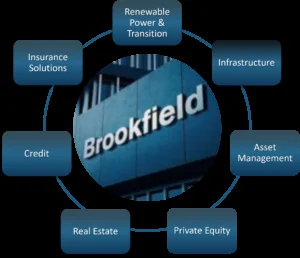Brookfield's $80B Nuclear Bet: The Hype, the Risk, and What It Means for Your Money
So, some hedge fund you've never heard of, Redmond Asset Management, upped its stake in Brookfield Infrastructure Co. by 57%. They now own a whopping... $2.3 million worth of the stock. Stop the presses. This is the kind of mind-numbing financial news that gets spat out by algorithms to fill column inches, designed to make you feel like something important is happening.
It’s not.
Let’s be real. This is the financial equivalent of watching paint dry. A bunch of other funds—HighTower, Nuveen, Brown Advisory—are all shuffling their BIPC shares around like bored kids trading baseball cards. The stock wobbles up and down by a few cents. Analysts can't even make up their minds, slapping it with everything from an "equal weight" to a "sell (d+)" rating, which sounds less like a financial analysis and more like a grade on a failed middle school book report. The consensus? "Reduce."
They’re telling you to get out while the big boys are getting in. What does that even mean? Is this just a classic case of institutional hot potato, where funds pass around a mediocre asset hoping someone else is left holding the bag when the music stops? Or is it something else? Because while everyone is staring at this little shell game, the real action is happening somewhere else entirely.
The $80 Billion Elephant in the Room
While the bean counters were busy celebrating their $2.3 million BIPC position, the parent company, Brookfield Asset Management, was busy doing something slightly more significant. They, along with uranium giant Cameco, just inked a deal with the U.S. government to build at least $80 billion worth of new nuclear reactors.
Let that sink in. Not million. Billion. With a 'B'.
This whole thing smells... off. No, 'off' is too polite. It's the kind of reek that peels paint off the walls. The U.S. government is going to "arrange financing" and "facilitate permitting." This is PR-speak for "we're going to use taxpayer money and muscle to make sure our corporate partners get paid." The official line from Commerce Secretary Howard Lutnick is that this supports "national security objectives." It's funny how "national security" always seems to align perfectly with guaranteeing profits for massive corporations, ain't it?

This is the ultimate sleight of hand. The financial news machine directs your attention to the tiny, mundane movements of a subsidiary stock like BIPC, making you track 50-day moving averages and P/E ratios. It’s like a magician furiously waving a red silk scarf. You’re so focused on the scarf you don't see him lifting your wallet with his other hand. The BIPC stock news is the red scarf. The $80 billion nuclear deal is your wallet, and it’s already gone.
So, what’s the catch for the goverment? They get a "participation interest." Sounds official. It means they get 20% of cash distributions... but only after Westinghouse (the company they all own) pays out the first $17.5 billion. How generous. When exactly do we think that magical threshold will be crossed? And who gets to do the accounting on that? I'm sure it'll all be perfectly transparent.
It's All Just a Game
I get so tired of this. It's the same playbook every single time. A critical industry—energy, defense, healthcare—is declared to be of "strategic importance." Then, the government steps in, not to run it as a public utility, but to de-risk the entire venture for a handful of private players who stand to make an absolute fortune. They get all the upside, and the public gets saddled with all the risk.
Cameco’s CEO, Tim Gitzel, isn’t even trying to hide it. He’s practically giddy, talking about "durable growth" and how this deal will "bolster broader confidence." My cynical translation: "We've got the U.S. government on the hook, so the money printer is officially set to brrrr." And offcourse, Cameco’s stock shot up over 20% on the news of the Canadian firms Cameco, Brookfield sign $80B US nuclear reactor deal with U.S. government. Shocking.
So while retail investors are getting analyst reports telling them to "Reduce" their holdings in the little guy, BIPC, the mothership is in a backroom shaking hands on a deal that could reshape the energy sector for decades, and honestly... it just feels like we're all being played for fools.
Am I just too cynical? Maybe this is how you build big things, with government and industry holding hands and singing kumbaya. But every time I see a deal this big, with this much public money involved and this little public oversight, I can’t help but wonder who’s really getting what they paid for. And I'm pretty sure it isn't us.
Follow the Money, Not the Press Release
Look, forget the noise. Forget the 13F filings and the quarterly dividend announcements for BIPC. It's all bread and circuses. The real story isn't about whether some fund bought 20,000 shares. The real story is that the system is working exactly as it was designed: to privatize profits and socialize risk on a scale that is almost impossible to comprehend. The $80 billion nuclear deal isn't an investment in America's future; it's a subsidy. It's corporate welfare on a god-tier level, and they're using fancy words like "partnership" and "national security" to sell it to you. Don't buy it.
Tags: brookfield stock
UK's Asylum Hotel Spending: The Billions Spent and the Growing Controversy
Next PostThe Absolute Mess That Is 'Concordium': Sorting Out the Crypto Hype From the Campus Drama
Related Articles
